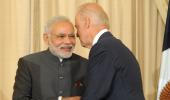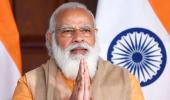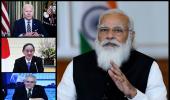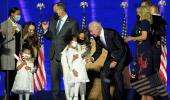The maiden bilateral meeting between President Joe Biden and Prime Minister Narendra Modi on Friday will further strengthen the US-India strategic ties and allow the leaders to discuss the situation in Afghanistan and how the two countries can work together to fight terrorism, a senior White House official has said.

The first in-person meeting at the White House will also provide added momentum to the Quad grouping, the official said.
Biden will host Modi at the White House for their first bilateral meeting on September 24. Later on that day, Biden will host the first-ever in-person Quad leaders' summit with Modi, Japanese Prime Minister Yoshihide Suga and Australian Prime Minister Scott Morrison.
Both Biden and Prime Minister Modi have spoken virtually on multiple occasions after the former, a Democrat, became US president in January. The last telephone conversation between them took place on April 26.
"The leaders will be focused on strengthening the deep ties between their people and shared democratic values that have underpinned the special bond between the United States and India for more than seven decades," the White House official said.
"The Biden-Harris administration has enhanced our partnership with India by working together to uphold a free and open Indo-Pacific, leading efforts to end the Covid-19 pandemic, and taking concerted action to address the climate crisis," the official told PTI.
The official said that US Vice President Kamala Harris will meet Prime Minister Modi on September 23. This will be the first meeting between the two leaders. Harris had earlier spoken with Modi over the phone in June during the Covid-19 crisis.
Harris is the first woman, the first Black American, and the first South Asian American to be elected vice president.
Addressing a press conference earlier, a senior official of the Biden administration said the Biden-Modi meeting would be an opportunity to go from strength to strength, from the point of view of the strategic partnership with India.
This can be done by working together to uphold a free and open Indo-Pacific, by taking steps to contribute to a global solution to the Covid-19 pandemic and by taking concerted action to address the climate crisis, the official said.
"So, the bilateral discussion between the US and India will help reinforce and give momentum to the Quad discussion because many of the topics are very much interrelated," the official said.
The evolving situation in the strategically vital Indo-Pacific region amidst China's aggressive muscle-flexing has become a major talking point among leading global powers.
"Additionally, in the bilateral meeting with Prime Minister Modi, the two leaders will have the opportunity to talk about counter-terrorism, the Afghanistan situation and how we can work together to fight terrorism, our common enemy, as well as about a range of regional issues and developments where we'll have the opportunity to compare notes," said the senior Biden administration official.
India and the US are in touch with each other on the Afghan crisis after the Taliban's takeover of Kabul on August 15.
Articulating India's views on the Afghan crisis, Modi has said the global community should decide 'collectively' and 'thoughtfully' on according recognition to the new set-up in Afghanistan in view of questions over its acceptability as the change of power was not 'inclusive.'
During a virtual address at a meeting on Afghanistan of the heads of state of the Shanghai Cooperation Organisation and the Collective Security Treaty Organisation on September 17, Modi also warned that continuing instability and fundamentalism in Afghanistan will embolden terrorist and extremist ideologies all over the world.
The Biden administration official noted that the relationship between the United States and India goes so much deeper than just a government-to-government relationship.
"It is a relationship between the two peoples. I think Prime Minister Modi and President Biden want to talk about the ways of pulling our countries even closer together at basically every level of interaction between our societies," added the official.











 © 2025
© 2025